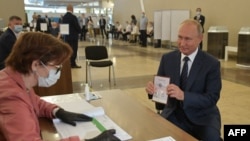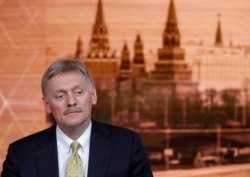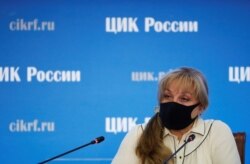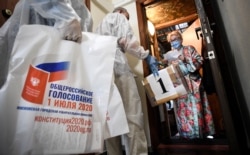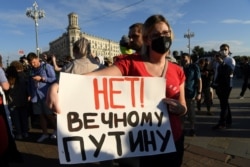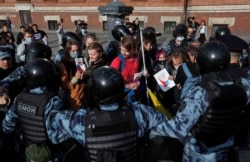Russia overwhelmingly embraced changes to the country's constitution in a weeklong national vote that ended Wednesday and was held during the coronavirus pandemic, scoring a controversial victory for President Vladimir Putin amid complaints of vote rigging and a constitutional coup by Kremlin critics.
Buried among nearly 200 amendments focusing on conservative and patriotic values was a little advertised measure to reset president term limits for Putin — in effect opening the door for the longtime Russian leader to remain in power beyond his current term and until the year 2036.
With nearly all votes counted, Russia’s Central Election Commission said 65% of registered voters had participated, with 78% endorsing the changes in an up or down vote. 21% voted against the packet of amendments, according to official results.
“De facto, this was a triumphant referendum of trust in President Putin,” said Kremlin spokesman Dmitry Peskov in assessing the outcome of the vote during a call with journalists on Thursday.
On the eve of the final day of voting, Putin urged all Russians to let their voices be heard.
“We’re voting for the country in which we want to live,” said Putin in a video address released on the eve of the vote.
“Each of our votes is the most important,” added Putin.
The Russian leader made no mention of the term limit extension, or that the both houses of parliament had already ratified the agreement, making the vote largely a question of optics.
An unusual vote
The vote was part of a carefully choreographed event initially scheduled for April — but was pushed back by Putin amid concerns over rapid spread of the coronavirus in Russia.
Russia on Thursday sat third in the global count for coronavirus infections, with just over 650,000 documented cases.
To assure voters to participate amid the outbreak, Russia’s Central Election Commissioner, Ella Pamfilova, unveiled what she termed “exclusive procedures” aimed at securing public safety while avoiding rules associated with a formal referendum.
The vote was extended for a full week, electronic voting was introduced in Moscow, and government vote monitors were put in place of independent observers, under new rules adopted.
“Our job is to control the vote, and it was absolutely impossible to control,” says Roman Udot of the independent election monitoring organization Golos in an interview with VOA.
“We’ve never had an experience like voting over a week. People were voting in streets, lawns, parks…everywhere.”
Voters were also screened for temperature checks and given masks and gloves and individual pens to mark ballots. The urns were disinfected every few hours.
“It’s perfectly safe,” said Nina Pavlovna, the head of a voting precinct central Moscow in an interview with VOA. “You can see we’re all wearing protective equipment.”
In an attempt to pump up turnout, prizes were also advertised — everything from free pizzas and soccer balls to raffles for smartphones, automobiles and government-gifted apartments.
Opposition leader Alexey Navalny compared the whole experience to a theater performance desperate for an audience.
“The only thing he needed was people to turn out, because you can’t perform a play without an audience,” said Navalny in a video released just before the vote ended.
“We will never recognize the result,” added Navalny.
Reality redefined
Despite appearances of an overwhelming victory, observers wondered the Kremlin had in effect achieved a result too glaringly at odds with the sour mood of the country.
Russia is just coming out of a three-month lockdown in the face of the pandemic that saw unemployment soar and Putin’s poll numbers go into a downward trend.
Voting stations were often empty and yet official turnout was high.
State-run polling that predicted support for the amendments also clashed with independent studies that showed society was highly split over the vote, and Putin’s extension on term limits in particular.
Greg Yudin, a professor and polling specialist at Russia’s Higher School of Economics, suggests that Russia’s mayors and governors may have “over-performed” in their zeal to please the Kremlin.
“No one had any doubt about their ability to achieve the numbers that they want. The issue is whether people will believe the results. And this is still up for grabs,” said Yudin in an interview with VOA.
“It might be too much. Too much to be credible,” added Yudin.
The dissenters
In central Moscow, several hundred demonstrators gathered on Pushkin Square to express outrage over the prospect of President Putin remaining in office for the next 16 years.
Although scores of police vans lined adjoining streets, no arrests were made.
“I don’t know anyone who voted for the amendment,” said Valentina Meshkova, a brand manager in her 20’s, in an interview with VOA.
“Russians think they can't change anything, although people are tired of Putin and want a better future,” she added, noting disappointment in the small turnout.
“It’s a constitutional coup,” said Alexey, 20, a student who wore a surgical face mask with the word “Nyet” – “No” in Russian - written on it.
“I decided not to participate in this circus,” he added. “But if they’d let me vote for specific amendments instead of all of them at once, I would have.”
In addition to the term limit extension, other high profile conservative amendments included a ban on gay marriage, a measure protecting “historical truth” of Soviet actions in World War II, and outlawing calls to “expropriate” Russian territory.
Other measures were targeted at working families — such as promise to re-index the pension fund and increases in funding for healthcare and education.
Even with the vote now secure, Putin has not indicated his intentions other than to say he is “not ruling out“ a run for the presidency following the end of his current term in 2024.
But observers have long argued Putin’s authority depends on the impression of a mandate — something lost in the rush to push through constitutional changes amid a global pandemic.
“It's obvious that Putin doesn’t have the support of the majority — that which has protected him over many years and gave him the basis to do what he wants,” opined Boris Vishnevsky, a liberal political with the Yabloko party in Saint Petersburg in his telegram channel.
“And practice shows that when people don’t believe in the authorities, in the end, they stop following them, too,” Vishnevsky said.




